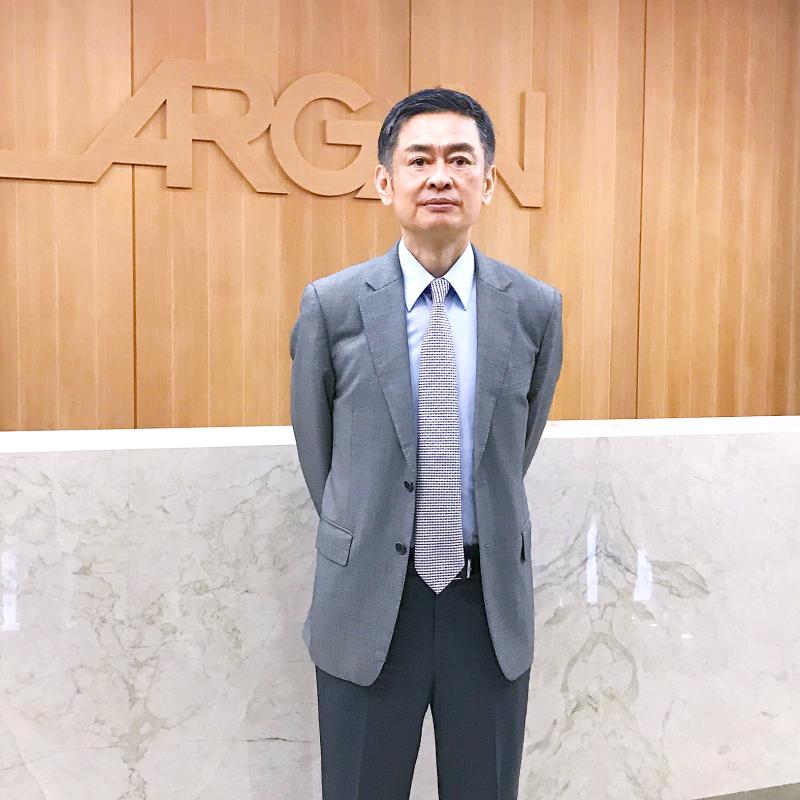Largan Precision Co (大立光), the nation’s leading camera lens manufacturer, saw its gross margin slide to 65.6 percent last quarter, from 68.6 percent a quarter earlier, after a major client canceled its orders, chief executive officer Adam Lin (林恩平) said yesterday.
“The client directly canceled all of its orders last month, which lowered our gross margin, as the client had requested high-specification orders with higher profit margin,” Lin told investors at an online earnings conference.
Lin did not name the client, while market speculation was that it was Chinese telecom equipment provider Huawei Technologies Co (華為), whose manufacturing has been disrupted by a US’ ban, demanding suppliers to stop shipping to Huawei if their products contain US technology.

Photo: Chen Mei-ying, Taipei Times
Largan has been talking with other clients to inquire if they are interested in placing more orders, but it would be “highly unlikely” that any new orders would be large enough to fill in for the allocations that were previously saved for the client, Lin said.
As a result, there is a chance that the firm’s capacity utilization rate would drop in the fourth quarter, Lin said.
The firm, which provides lenses for Apple Inc’s iPhone as well as Android phone vendors such as Samsung Electronics Co, declined to reveal how much Huawei’s orders had contributed to its previous revenue reports.
Lin expected the firm’s shipping momentum, which depends on the sales performance of its clients, to remain flat this month from last month, he said.
“Although our clients often update their forecast, there is still a high uncertainty, as it is unpredictable how their new mobile phones will sell,” Lin said.
The third-quarter gross margin of 65.6 percent was the lowest after 64.24 percent recorded in the first quarter last year, company data showed.
Largan would continue focusing on high-end lenses for premium smartphones, Lin said.
Many handset vendors increasingly favor mid-range and low-end smartphones, which has increased pressure on the firm to compete with other lens suppliers, he said.
“There is a figure for gross margin in my mind, and we will not accept orders with gross margins lower than that, although I cannot tell you how high this number is,” Lin said to investors.
Largan’s third-quarter net income plunged 30 percent year-on-year to NT$5.86 billion (US$202.31 million), due to an unfavorable product portfolio and foreign exchange losses of NT$710 million with the New Taiwan dollar strengthening against the US dollar, Lin said.
Its earnings per share were NT$43.74 in the third quarter, while in the first three quarters they totaled NT$131.
Although Largan’s stock price has dropped to a relatively low level, the company has no plan to buy back its shares, Lin said.

UNCERTAINTY: Innolux activated a stringent supply chain management mechanism, as it did during the COVID-19 pandemic, to ensure optimal inventory levels for customers Flat-panel display makers AUO Corp (友達) and Innolux Corp (群創) yesterday said that about 12 to 20 percent of their display business is at risk of potential US tariffs and that they would relocate production or shipment destinations to mitigate the levies’ effects. US tariffs would have a direct impact of US$200 million on AUO’s revenue, company chairman Paul Peng (彭雙浪) told reporters on the sidelines of the Touch Taiwan trade show in Taipei yesterday. That would make up about 12 percent of the company’s overall revenue. To cope with the tariff uncertainty, AUO plans to allocate its production to manufacturing facilities in

TAKING STOCK: A Taiwanese cookware firm in Vietnam urged customers to assess inventory or place orders early so shipments can reach the US while tariffs are paused Taiwanese businesses in Vietnam are exploring alternatives after the White House imposed a 46 percent import duty on Vietnamese goods, following US President Donald Trump’s announcement of “reciprocal” tariffs on the US’ trading partners. Lo Shih-liang (羅世良), chairman of Brico Industry Co (裕茂工業), a Taiwanese company that manufactures cast iron cookware and stove components in Vietnam, said that more than 40 percent of his business was tied to the US market, describing the constant US policy shifts as an emotional roller coaster. “I work during the day and stay up all night watching the news. I’ve been following US news until 3am

COLLABORATION: Given Taiwan’s key position in global supply chains, the US firm is discussing strategies with local partners and clients to deal with global uncertainties Advanced Micro Devices Inc (AMD) yesterday said it is meeting with local ecosystem partners, including Taiwan Semiconductor Manufacturing Co (TSMC, 台積電), to discuss strategies, including long-term manufacturing, to navigate uncertainties such as US tariffs, as Taiwan occupies an important position in global supply chains. AMD chief executive officer Lisa Su (蘇姿丰) told reporters that Taiwan is an important part of the chip designer’s ecosystem and she is discussing with partners and customers in Taiwan to forge strong collaborations on different areas during this critical period. AMD has just become the first artificial-intelligence (AI) server chip customer of TSMC to utilize its advanced

Six years ago, LVMH’s billionaire CEO Bernard Arnault and US President Donald Trump cut the blue ribbon on a factory in rural Texas that would make designer handbags for Louis Vuitton, one of the world’s best-known luxury brands. However, since the high-profile opening, the factory has faced a host of problems limiting production, 11 former Louis Vuitton employees said. The site has consistently ranked among the worst-performing for Louis Vuitton globally, “significantly” underperforming other facilities, said three former Louis Vuitton workers and a senior industry source, who cited internal rankings shared with staff. The plant’s problems — which have not